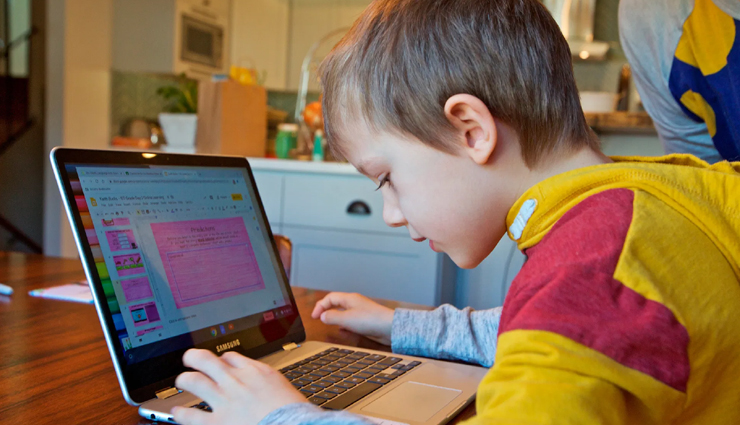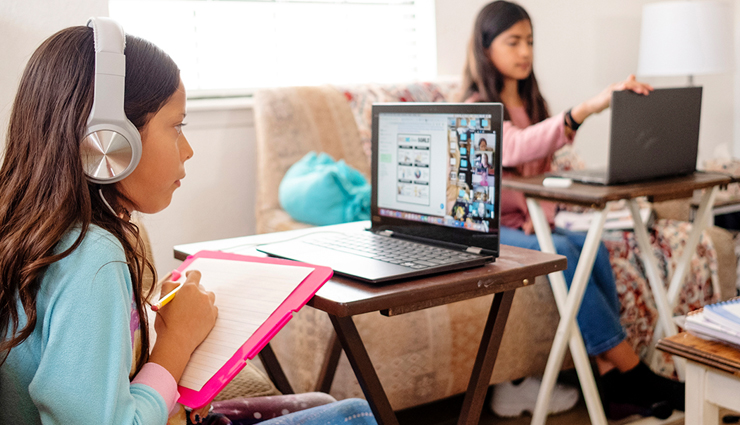- Home›
- Mates & Me›
- Tips To Engage And Motivate Your Child For Remote Learning
Tips To Engage And Motivate Your Child For Remote Learning
By: Varsha Tue, 29 Sept 2020 12:31:08

Today, let's consider Tips To Engage and Motivate Your Child in Remote Learning.
We have two priorities here:
- Engage your child by giving them more control and autonomy, and helping them feel more related to the other students.
- Motivate your child by setting up the environment and schedule to support your child in staying focused, so they begin to enjoy a sense of mastery and competence.
Here's your guide.
So, a good approach to thinking about motivating kids of all ages to do school work is to consider two questions:
1) How can I help them believe they will be successful?
2) How can I increase the value of the activity?

Goal setting and progress monitoring Goal setting and progress monitoring are powerful motivators because they impact both the expectancy of success and the value of the task. Some tips for good goal setting:
- Check in with your child’s teacher about goals for the class and your child and how they are tracking them. If the teacher has already set clear goals and tracking methods, post them clearly and have conversations with your child about their progress. You can skip down to the last two bullets in this list.
- Have a goal-setting conversation with your child. When students are part of the conversation, they develop ownership of the goal, which makes it more valuable. Here are some quick examples for different ages:
- Age 6: At this age give the child short-term goals and very specific choices. Example: “Let’s pick one thing we really want to make sure we get done this morning. We could write the sentences to go with these three pictures, or we could finish these 10 addition problems.”
- Age 11: Work with children this age to create longer-term goals that are broken into smaller pieces. The parent should continue to provide guidance like, “Hmmm… how will your Friday-self feel if you wait to do all your work on Friday?” Example: “Let’s set your math goals for each day this week. Let’s look at your material. What do you want to have done by the end of the week? (Or what does your teacher say you need to get done by the end of the week?) How do you want to break that up over the five days this week?
- Age 16: Focus students of this age on what they want to learn, and then shift to what they need to do in order to learn it. Example: “So what do you need to learn in this unit? What do you need to do to learn that? How long are you working on this unit? How will you break up what you need to do over that time?”

- Make sure the goal is reasonable and can be done in a short time. If you choose a longer-term goal, set milestones along the way. Setting a reasonable target helps ensure students experience success, which will motivate them to make further progress.
- Determine how you will know if the student is making progress toward the goal and how you will know they have reached it. Think of how many apps we have that track our exercise or budgets. We can similarly track good learning behavior. Having a measurable goal is key to knowing if you’ve reached it, and therefore getting those positive feelings that come with success.
- Talk about how the goal relates to things your child values. Is it a skill they are interested in learning related to a hobby? Is the goal related to a future job they want? Is it related to something else they want to learn? Making the activity relevant to the child increases its value.
- Document what your child can do if they get stuck. Students aren’t going to be 100% successful when they are learning. Make a plan for how they will get help when they get stuck so they are less likely to quit and see a path to success even when they struggle.

Making the most of rewards
Finally, when we talk about motivation and goals, the question always arises: should we give kids rewards for their schoolwork? Expectancy-Value Theory presents rewards as one way to increase the value of a task. However, rewards can have downsides as well, such as actually reducing the internal motivation students may already have for a task. So, if you are going to use them, here are suggestions:
- Remember that there are all kinds of rewards, including praise, a little extra time at bedtime, or a trip to the playground. Keep rewards small, and focus on things you are willing to give repeatedly.
- Use rewards to encourage students to do something they are otherwise not likely to do. Give rewards frequently and for small things at first, and then gradually lengthen out the time between rewards as students come to experience the natural benefits of their behavior.
- Make sure students know what specific behavior is being rewarded.
- Focus rewards on effort, not results.
- Occasionally give surprise rewards. Make the timing and type of the reward unexpected. When people know a reward is available but don’t know when they’ll receive it, they are more likely to persist in the behavior that results in the reward.
- For older students, work together on a plan that includes what effort and outcomes will result in rewards.





